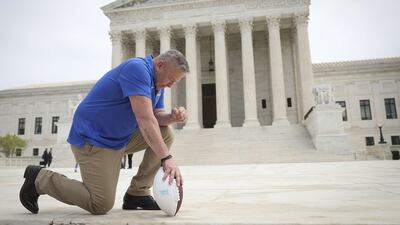The US Supreme Court on Monday sided with an American football coach from Washington state who wanted to kneel and pray on the field after games.
The court ruled 6-3 for the coach, with the court's conservative justices in the majority and its liberals in dissent. The justices said the coach's prayer was protected by the First Amendment of the US Constitution.
“The constitution and the best of our traditions counsel mutual respect and tolerance, not censorship and suppression, for religious and nonreligious views alike,” Justice Neil Gorsuch wrote for the majority.
The case forced the justices to wrestle with how to balance the religious and free speech rights of teachers and coaches with the rights of pupils not to feel pressured into participating in religious practices. The outcome could strengthen the acceptability of religious practices in other public school settings.
The ruling comes days after the heavily conservative court issued two historic rulings, one ending the federal right to abortion and the other expanding gun rights.
The decision is the latest in a line of Supreme Court rulings in favour of religious plaintiffs. In another recent case, the court ruled that the state of Maine cannot exclude religious schools from a programme that offers tuition aid, a decision that could expand religious organisations' access to taxpayer money.
In a dissenting opinion on Monday, Justice Sonia Sotomayor wrote that the coach decision “sets us further down a perilous path in forcing states to entangle themselves with religion”. She was joined in her dissent by Justice Stephen Breyer and Justice Elena Kagan.
That the court ruled for the coach is perhaps not surprising. In 2019, the court declined to take up the case at an early stage, but four of the court’s conservatives agreed that a lower court decision in favour of the school district was “troubling” for its “understanding of the free speech rights of public school teachers”.

The case before the justices involved Joseph Kennedy, a Christian and former football coach at Bremerton High School in Bremerton, Washington.
Mr Kennedy started coaching at the school in 2008 and initially prayed alone on the 50-yard line at the end of games. But pupils started joining him and over time, he began to deliver a short, inspirational talk with religious references.
The former courch did this for years and led players in locker room prayers. The school district learnt what he was doing in 2015 and asked him to stop.
He stopped leading prayers in the locker room and on the field but wanted to continue praying on the field himself, with others free to join if they wished.
Concerned about being sued for breaching pupils' religious freedom rights, the school asked him to stop the practice of kneeling and praying while still “on duty” as a coach after the game. The school tried to work out a solution so Mr Kennedy could pray privately before or after the game.
When he continued to kneel and pray on the field, the school put him on paid leave.
Three justices on the court attended public high schools themselves while the rest attended Catholic schools.

